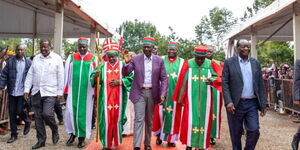President William Ruto on Wednesday, September 14, evoked mixed reactions after releasing a statement rescinding the autonomy Sahrawi Arab Democratic Republic (SADR), a day after the nation's president Brahim Ghali attended the inauguration ceremony at Kasarani Stadium.
Ruto, in a tweet that has since been deleted, stated that his administration would work with the government of Morocco instead. Sahrawi, which is agitating for independence from Morocco, is seeking to transition from a semi-autonomous region to self-governance.
“At State House in Nairobi, received a congratulatory message from His Majesty King Mohammed VI.
"Kenya rescinds its recognition of the SADR and initiates steps to wind down the entity’s presence in the country,” the deleted tweet stated.
Ruto added that Kenya "supports the United Nations framework as the exclusive mechanism to find a lasting solution of the dispute over Western Sahara."
Former president Uhuru Kenyatta during his tenure as the President of the Union Peace and Security Council championed engagements between SADR and Morocco on the conflicted Western Sahara territory.
The previous administrations of presidents Mwai Kibaki and Daniel Moi also supported Sahrawi in its quest to pursue autonomy through a referendum. SADR was recognized by the Organization of African Union (OAU), now AU in 1982.
Location
SADR, also known as Western Sahara is located in North West Africa. It borders the Atlantic Ocean, Morocco, Algeria and Mauritania.
The Spanish-speaking country’s capital city is El-Aaiún. Sahrawi, however, has been operating from Tifariti since it lost control of the capital city.
The nation’s autonomy has always been disputed with the Kingdom of Morocco claiming that SADR is part of its territory.
Nonetheless, 41 United Nations (UN) member states (with Kenya among them) recognized SADR as an independent sovereign nation.
On the other hand, the USA became the first nation to formally recognize SADR as part of the Moroccan Territory.
Annexation of Western Sahara
The genesis of the push and pull between Morocco and SADR was after the exit of their coloniser, Spain in 1976.
Polisario Front which was leading charges of Western Sahara’s quest for independence proclaimed SADR as a self-determined nation.
King Hassan of Morocco filed a case at the International Court of Justice (ICJ) claiming ownership of the 266,000 square kilometres of territory in Western Sahara. The two nations sought to control the area rich in minerals and fishing opportunities.
The ICJ ruled that “there were no ties of sovereignty between Western Sahara and Morocco” and further ordered a determination of the matter through a referendum.
The Moroccans launched the Green March, a military operation that culminated in Morocco’s occupation of SADR’s territory.
Spain then handed control of SADR to Morocco and Mauritania which claimed ownership of the territory. Over the years, SADR has been agitating for full determination with the support of most African countries.
Prior to Ruto's statement, only USA had sided with Morocco by formally recognizing Morocco's control over the sovereignty of SADR.
Whilst his move has been subjected to sharp criticism, all eyes will be on William Ruto's administration and on which foreign policy it will adopt.
Close ties with Morocco would reverse the moves made by his predecessor, Uhuru Kenyatta, in establishing cordial relations with Algeria and SADR.












